ARTICLE AD BOX
53 minutes ago
By David Gritten, BBC News

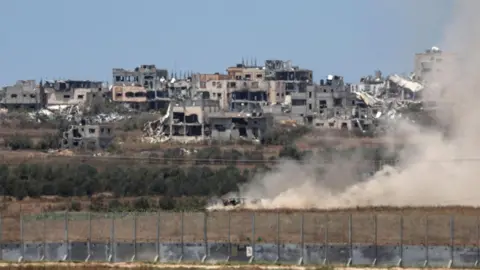 EPA
EPA
There has been fierce fighting between Palestinian armed groups and Israeli forces in Gaza City's Shejaiya district
Israel’s military says Palestinian armed groups in Gaza have launched about 20 rockets towards Israeli border communities - the heaviest such attack in months.
A number of the projectiles were intercepted and others landed inside southern Israel, but no injuries were reported. The military said it responded with artillery fire.
Palestinian Islamic Jihad (PIJ) said it launched the barrage in response to Israeli “crimes”.
It came as fierce fighting continued for a fifth day in Shejaiya in the north of Gaza and an Israeli soldier was killed in the southern Rafah area.
On Sunday, Israel’s prime minister said its troops were engaged in a “difficult fight” across the entire Palestinian territory.
The Israeli military launched a campaign to destroy Hamas in response to an unprecedented attack on southern Israel on 7 October, during which about 1,200 people were killed and 251 others were taken hostage.
More than 37,900 people have been killed in Gaza since then, including 23 over the past 24 hours, according to the territory's Hamas-run health ministry.

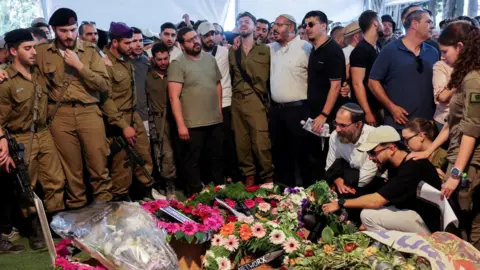 Reuters
Reuters
The Israeli military said two soldiers were killed in combat in northern Gaza on Friday
On Monday morning, sirens sounded in Israeli communities near the Gaza border fence, many of which have been evacuated since the 7 October attack.
The Eshkol Regional Council later reported that 18 rockets were launched towards areas it governs, according to the Jerusalem Post. Most landed in open areas, but one fell “in the area of Kibbutz Holit’s fence”, it said. Another rocket was intercepted by the Iron Dome missile defence system, it added.
The Times of Israel reported that Monday’s barrage was the largest from Gaza since January, when at least 25 rockets were launched towards the city of Netivot.
The Israel Defense Forces (IDF) said the latest rocket-fire had come from the southern Khan Younis area and that its artillery had struck the sources.
Palestinian news agency Wafa reported that artillery strikes on Monday killed one civilian and wounded several others in the town of Khuzaa, which is south-east of the city of Khan Younis.
Israeli warplanes had also targeted a street in Shejaiya, in the east of Gaza City, and an area north of Nuseirat refugee camp, in central Gaza, it said.
Hamas’s military wing meanwhile said its fighters had targeted two Israeli tanks with explosive devices in Shejaiya.
The IDF said in a statement that its troops had “eliminated numerous terrorists in close-quarters encounters and located large quantities of weapons” during raids in Shejaiya. Air strikes had killed about 20 others and destroyed weapons manufacturing and storage facilities in the area, it added.
A battle has raged there since Thursday, when Israeli troops went back into the area following what the IDF said was “intelligence indicating the presence of terrorists and terrorist infrastructure”.
Over the weekend, residents said the assault had left bodies lying in the street, while the IDF said two Israeli soldiers had been killed in combat in northern Gaza.
The UN agency for Palestinian refugees (Unrwa) said up to 80,000 people in Shejaiya and surrounding areas had been told by the IDF to evacuate and head south, but that they were being pushed westwards because they could not pass through Israeli checkpoints in the Wadi Gaza area.
“The Israeli army has completely destroyed the neighbourhood,” a woman from the neighbouring Tuffah district told BBC Arabic’s Gaza Lifeline programme.
“Along with others, I fled as shells rained down around us. We moved from one area to another until we managed to escape the neighbourhood. But many residents were trapped and unable to leave," she added.
"We are experiencing hunger, fear, killing, displacement, and total destruction.”

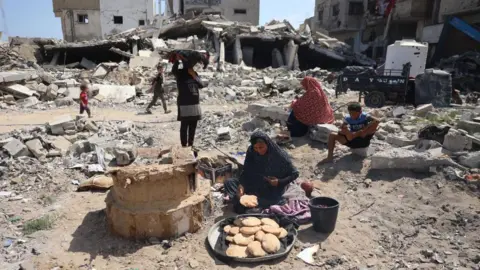 AFP
AFP
UN officials said the humanitarian situation was becoming increasingly desperate for Palestinian civilians in Gaza
Palestinian fighters have regrouped in several northern areas which were the focus of the Israeli ground offensive in the first three months of the war.
Rafah has been the main focus since early May, and the IDF believes it has now degraded the capabilities of three of the four Hamas battalions in the city.
Some of the estimated 10,000 people still in the city told Reuters news agency that Israeli tanks had pushed further into western and central areas on Monday, a day after they reportedly moved to within 1km (0.6 miles) of the Mediterranean coast.
The IDF meanwhile announced that one of its soldiers had been killed in combat in southern Gaza on Monday.
It provided no further details about the incident, but Hamas said earlier that its fighters had blown up a booby-trapped house in Rafah after luring Israeli troops into it.
In another development on Monday, the head of al-Shifa hospital in Gaza City was released after seven months in Israeli custody. Dr Mohammad Abu Salmiya alleged that he was tortured in custody. Israel denies mistreating detainees.
On Sunday, Prime Minister Benjamin Netanyahu told a cabinet meeting that Israeli forces were operating “everywhere in the Gaza Strip” and killing “dozens of terrorists” every day.
“This is a difficult fight that is being waged above ground, sometimes in hand-to-hand combat, and below ground as well,” he warned.
“We are committed to fighting until we achieve all of our objectives: eliminating Hamas, returning all of our hostages, ensuring that Gaza never again constitutes a threat to Israel and returning our residents securely to their homes,” he added.
Unrwa’s director of planning, Sam Rose, told the BBC from Nuseirat camp that the humanitarian situation was becoming increasingly desperate for Gaza’s 2.2 million population, three quarters of which is displaced.
“People need water, people need healthcare. It’s getting hot here, it’s 35 degrees [Celsius], the stench of sewage, the lack of solid waste management facilities, the area is essentially becoming a dumping site [for rubbish],” he said.
“Fuel isn’t coming in in adequate quantities through the crossing points. Without that, incubators cannot work, the water wells cannot work... Doing the most simple of things is a real struggle for everyone.”

 4 months ago
23
4 months ago
23
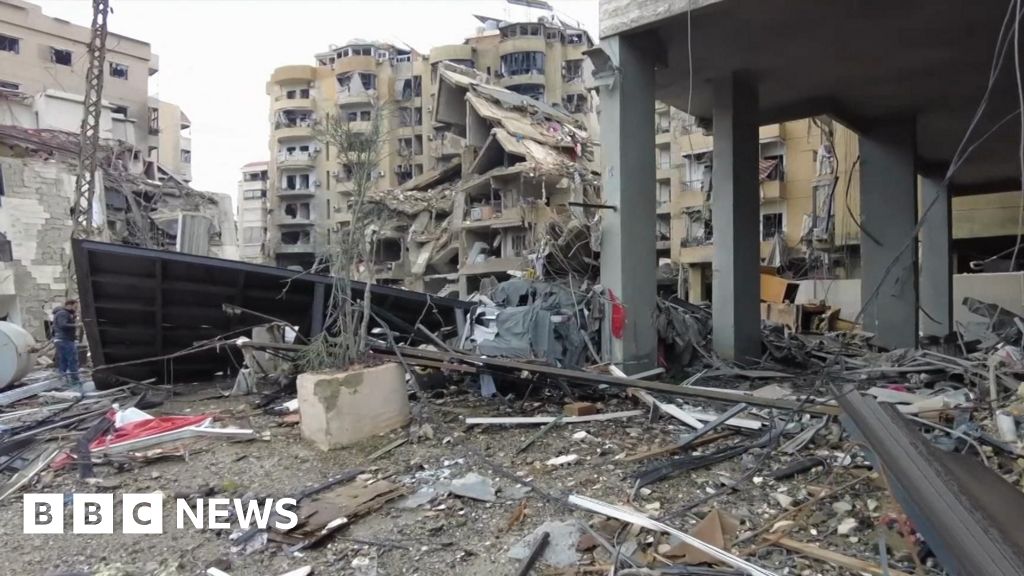

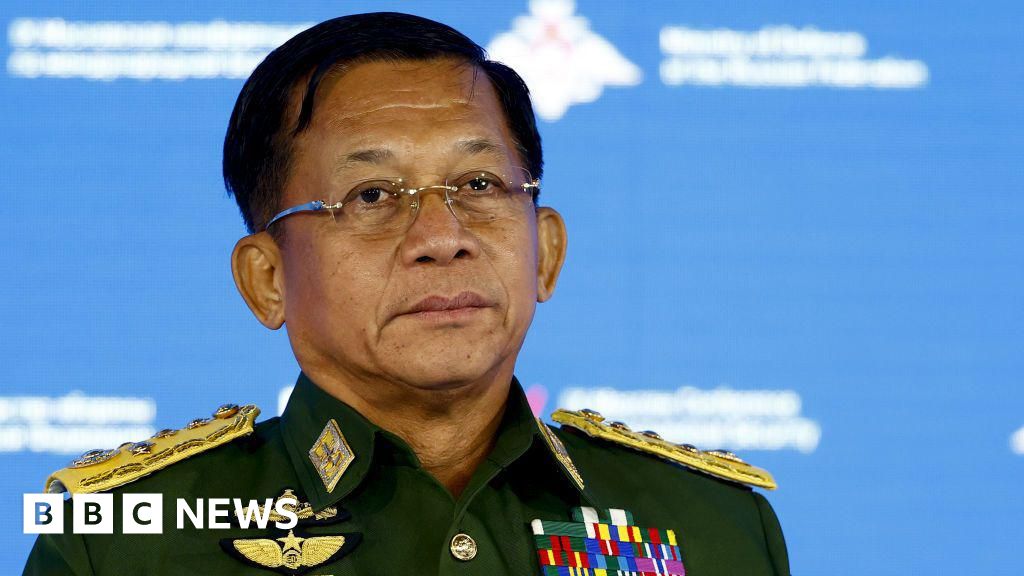





 English (US)
English (US)